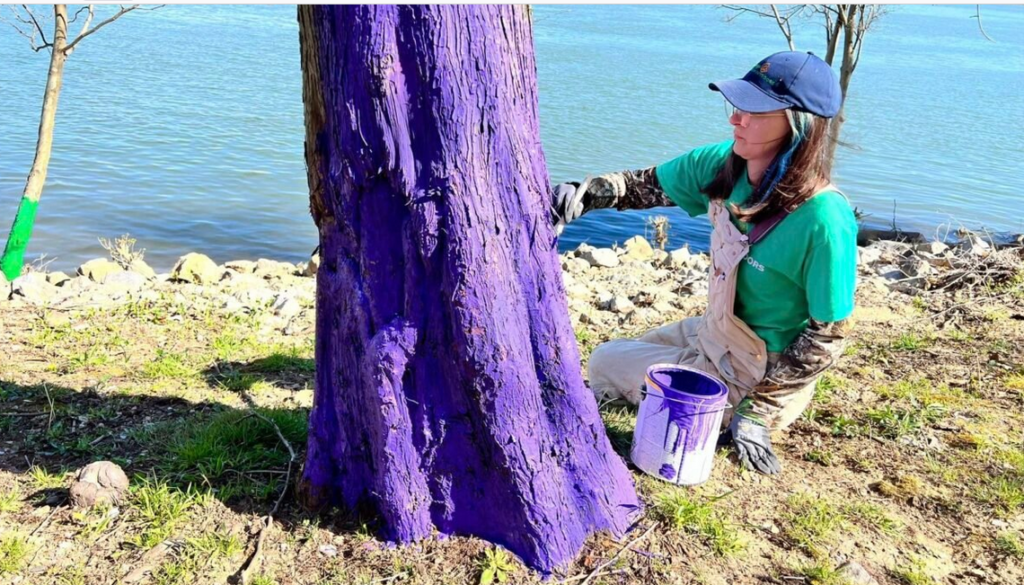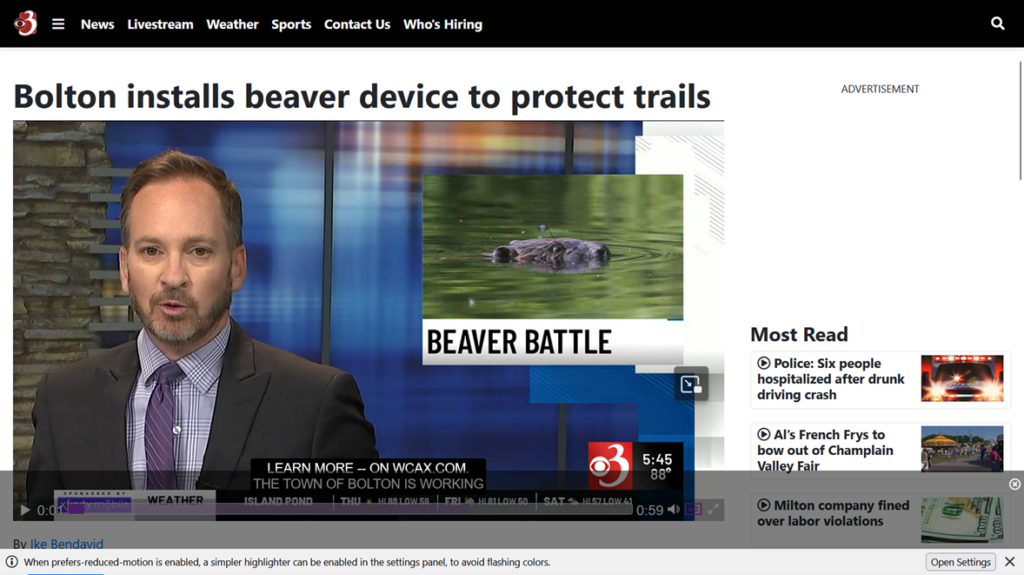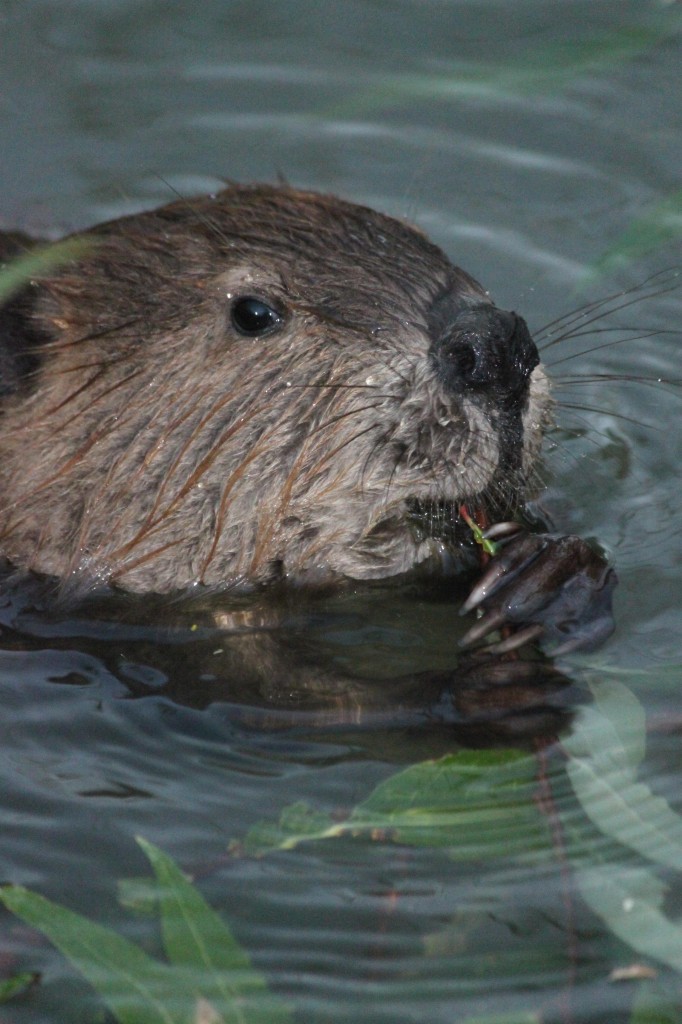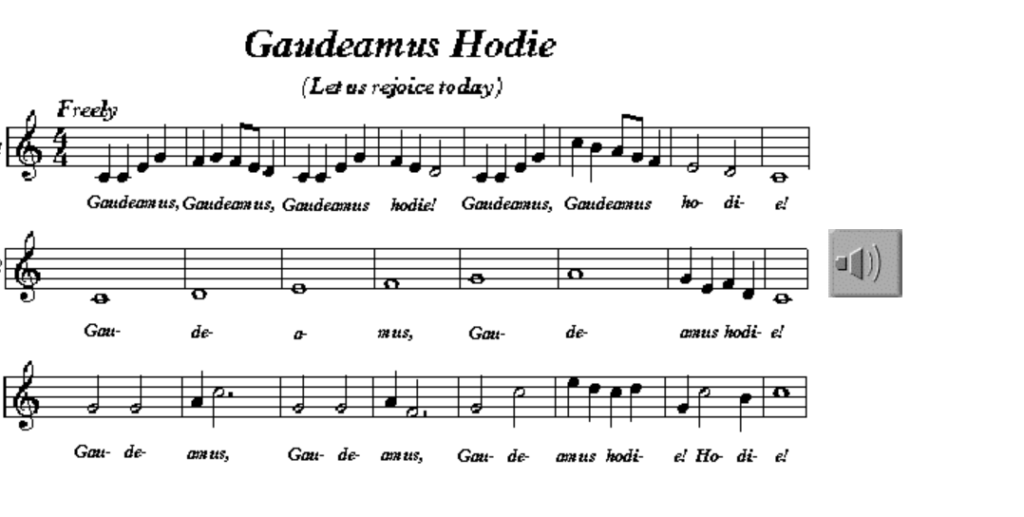Yet another surprise to come out of the Volunteer state, this one in the form of sand painting. They seem to be towards the end of a game of ‘telephone’ – remember that elementary game where you sat in a circle and whispered into the ear of the child next to you so that one by one the message made it’s way around the room? By the time it gets to the end of the line it’s a little tangled up.
But at least they get it. And that’s huge.
 Trees in Tennessee’s Chattanooga city are being painted with non-toxic paint in a bid to prevent unnecessary beaver deaths in the US.
Trees in Tennessee’s Chattanooga city are being painted with non-toxic paint in a bid to prevent unnecessary beaver deaths in the US.
The bottom of the trunks are being painted in bright colors. The move came about after the city’s Parks and Outdoors department consulted the Humane Society of the United States (HSUS). The latter provided advice for a non-lethal solution to the problem of beavers destroying riverfront trees to make dams.
Despite being a natural activity for the species, beavers’ chewing can leave tree trunks significantly weakened. Specifically, in Chattanooga, trees have the potential to fall into a nearby children’s playground or across a pedestrian footpath.
Never mind about the BRIGHT colors, or the fact that this NEW technique has been around a decade before Martinez tried it more than a decade ago. Never mind that we found it lasts no more than 5 years and needs to be reapplied when the tree grows. They are taking steps towards coexistence, and that’s something.
Chattanooga’s Parks and Outdoors department claims to have tried a number of preventative tactics before turning to painted tree trunks. These included protective fences – which the beavers climbed – and dousing trunks in hot sauce, which washed off in the rain.
So far, the most successful approach has been the use of non-toxic latex paint mixed with water and sand. The sand acts as an irritant to the beavers’ sensitive teeth, causing them to go looking for wood elsewhere. It is noted that painted trees have displayed light bite marks but nothing more, leading to assumptions that the painting technique is working.
This year is the first that officials have noted repeated beaver activity. According to Brian Smith, the Chattanooga Parks and Outdoors communications and marketing director, it is unclear where the beavers are taking their wood hauls. However, when they source wood that does not pose a threat to human health, they are largely left alone. And, considered a vital part of the region’s biodiversity.
Of course they do supplement with a lot of aquatic plants and grasses especially as the season gets greener. Your trees will be more endangered in the dead of winter when there’s nothing else to choose.
HSUS states that beavers are not the only animals killed to “manage” human-wildlife conflicts in the US. It highlights that many species labeled as nuisances are also “culled,” instead of encouraged to carry out their natural activities away from human populations.
Raccoons, skunks, chipmunks, and even bears are specifically named by HSUS as species threatened by such extreme measures. The nonprofit subsequently calls for a change in tack, as killing animals “only addresses the symptom of the problem, not the cause.” As such, the issue is likely to recur.
The Wild Neighbors program sees HSUS working with local agencies across the US. These include animal shelters, law enforcement, wildlife agencies, and more. In total more than 630 are signed up to the initiative that produces and promotes educational resources about how humans and non-human animals can coexist, without choosing lethal action.
HSUS reports that since 2020, it has trained more than 7,000 animal care and control experts to use non-lethal resolution techniques when dealing with wildlife.
The Humane Society came to the Martinez Beaver meeting long ago. Just remember that before there was Worth A Dam or the Beaver Brigade or the Beaver project or Beavers Northwest, there was HSUS. In fact it was John Hadidian at the HSUS that paid for Skip Lisle to come do a class on flow devices that inspired Mike Callahan in the first place back in the day.
There would beaver no beaver Institute at all if it weren’t for the Humane Society. Think about that.
Just so you know, though, bright colors don’t work “Better” and ask someone how to secure wire wrap because it lasts a lot longer when its done correctly.







 Crews Wednesday built and installed a Beaver Deceiver. The device controls the flow of the water so when it gets too high, it will drain while keeping the trail from flooding.
Crews Wednesday built and installed a Beaver Deceiver. The device controls the flow of the water so when it gets too high, it will drain while keeping the trail from flooding.
 Trees in Tennessee’s Chattanooga city are being painted with non-toxic paint in a bid to prevent unnecessary beaver deaths in the US.
Trees in Tennessee’s Chattanooga city are being painted with non-toxic paint in a bid to prevent unnecessary beaver deaths in the US.




































